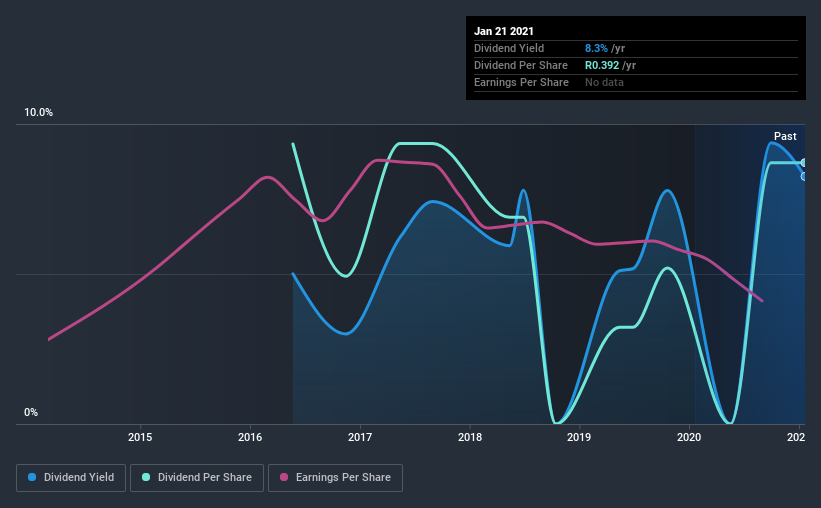- South Africa
- /
- Consumer Durables
- /
- JSE:BWN
Are Dividend Investors Making A Mistake With Balwin Properties Limited (JSE:BWN)?
Dividend paying stocks like Balwin Properties Limited (JSE:BWN) tend to be popular with investors, and for good reason - some research suggests a significant amount of all stock market returns come from reinvested dividends. If you are hoping to live on your dividends, it's important to be more stringent with your investments than the average punter. Regular readers know we like to apply the same approach to each dividend stock, and we hope you'll find our analysis useful.
With a goodly-sized dividend yield despite a relatively short payment history, investors might be wondering if Balwin Properties is a new dividend aristocrat in the making. It sure looks interesting on these metrics - but there's always more to the story. Some simple analysis can offer a lot of insights when buying a company for its dividend, and we'll go through this below.
Explore this interactive chart for our latest analysis on Balwin Properties!

Payout ratios
Companies (usually) pay dividends out of their earnings. If a company is paying more than it earns, the dividend might have to be cut. Comparing dividend payments to a company's net profit after tax is a simple way of reality-checking whether a dividend is sustainable. In the last year, Balwin Properties paid out 30% of its profit as dividends. This is a medium payout level that leaves enough capital in the business to fund opportunities that might arise, while also rewarding shareholders. Plus, there is room to increase the payout ratio over time.
Another important check we do is to see if the free cash flow generated is sufficient to pay the dividend. Last year, Balwin Properties paid a dividend while reporting negative free cash flow. While there may be an explanation, we think this behaviour is generally not sustainable.
Remember, you can always get a snapshot of Balwin Properties' latest financial position, by checking our visualisation of its financial health.
Dividend Volatility
Before buying a stock for its income, we want to see if the dividends have been stable in the past, and if the company has a track record of maintaining its dividend. Balwin Properties has been paying a dividend for the past five years. During the past five-year period, the first annual payment was R0.4 in 2016, compared to R0.4 last year. This works out to be a decline of approximately 1.4% per year over that time. Balwin Properties' dividend hasn't shrunk linearly at 1.4% per annum, but the CAGR is a useful estimate of the historical rate of change.
We struggle to make a case for buying Balwin Properties for its dividend, given that payments have shrunk over the past five years.
Dividend Growth Potential
With a relatively unstable dividend, it's even more important to see if earnings per share (EPS) are growing. Why take the risk of a dividend getting cut, unless there's a good chance of bigger dividends in future? Over the past five years, it looks as though Balwin Properties' EPS have declined at around 9.6% a year. A modest decline in earnings per share is not great to see, but it doesn't automatically make a dividend unsustainable. Still, we'd vastly prefer to see EPS growth when researching dividend stocks.
Conclusion
Dividend investors should always want to know if a) a company's dividends are affordable, b) if there is a track record of consistent payments, and c) if the dividend is capable of growing. First, we like Balwin Properties' low dividend payout ratio, although we're a bit concerned that it paid out a substantially higher percentage of its free cash flow. Earnings per share are down, and Balwin Properties' dividend has been cut at least once in the past, which is disappointing. With this information in mind, we think Balwin Properties may not be an ideal dividend stock.
Companies possessing a stable dividend policy will likely enjoy greater investor interest than those suffering from a more inconsistent approach. Still, investors need to consider a host of other factors, apart from dividend payments, when analysing a company. Just as an example, we've come accross 5 warning signs for Balwin Properties you should be aware of, and 2 of them can't be ignored.
We have also put together a list of global stocks with a market capitalisation above $1bn and yielding more 3%.
When trading Balwin Properties or any other investment, use the platform considered by many to be the Professional's Gateway to the Worlds Market, Interactive Brokers. You get the lowest-cost* trading on stocks, options, futures, forex, bonds and funds worldwide from a single integrated account. Promoted
Valuation is complex, but we're here to simplify it.
Discover if Balwin Properties might be undervalued or overvalued with our detailed analysis, featuring fair value estimates, potential risks, dividends, insider trades, and its financial condition.
Access Free AnalysisThis article by Simply Wall St is general in nature. It does not constitute a recommendation to buy or sell any stock, and does not take account of your objectives, or your financial situation. We aim to bring you long-term focused analysis driven by fundamental data. Note that our analysis may not factor in the latest price-sensitive company announcements or qualitative material. Simply Wall St has no position in any stocks mentioned.
*Interactive Brokers Rated Lowest Cost Broker by StockBrokers.com Annual Online Review 2020
Have feedback on this article? Concerned about the content? Get in touch with us directly. Alternatively, email editorial-team (at) simplywallst.com.
About JSE:BWN
Balwin Properties
Engages in the development and sale of residential properties in South Africa.
Proven track record with mediocre balance sheet.
Similar Companies
Market Insights
Community Narratives




